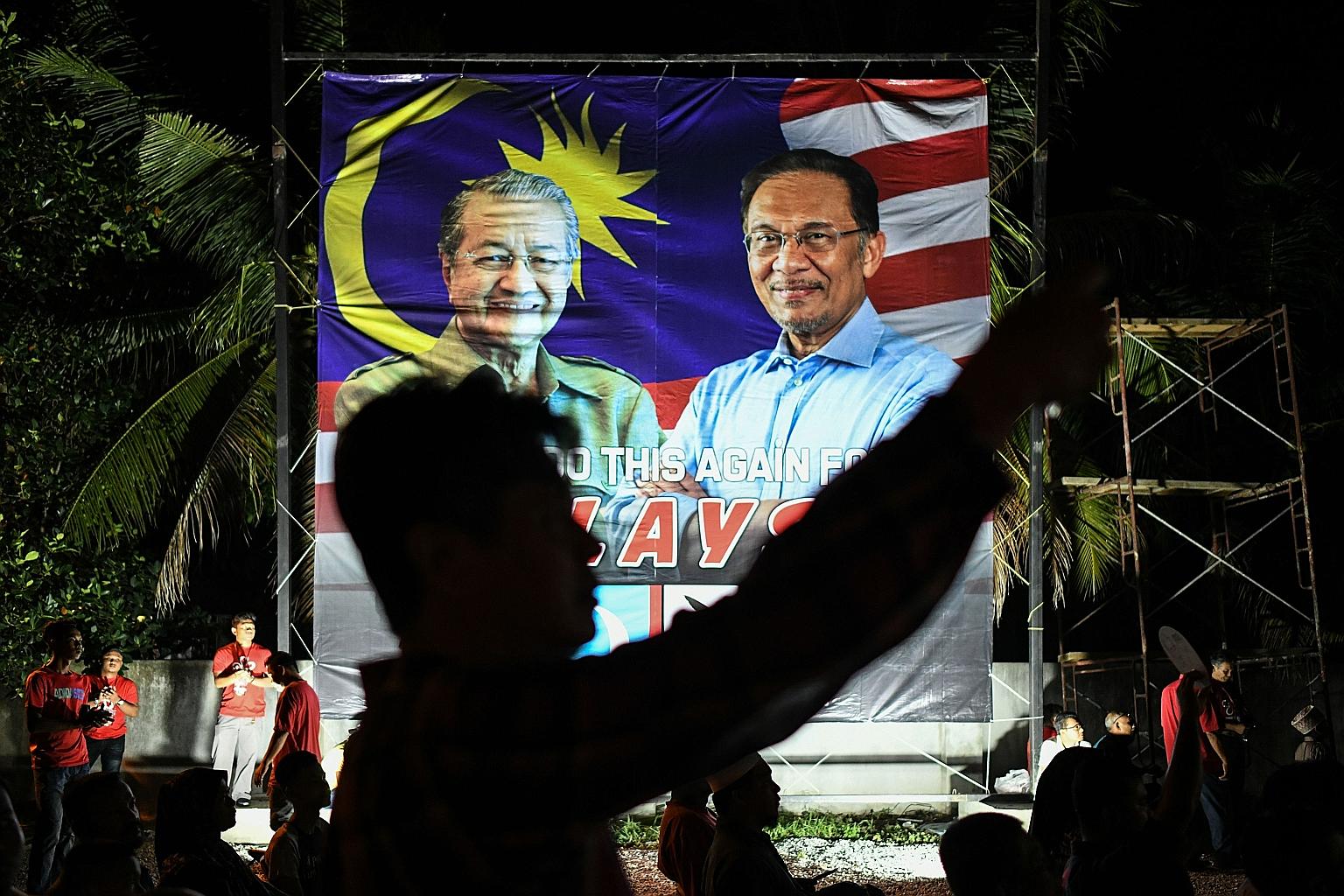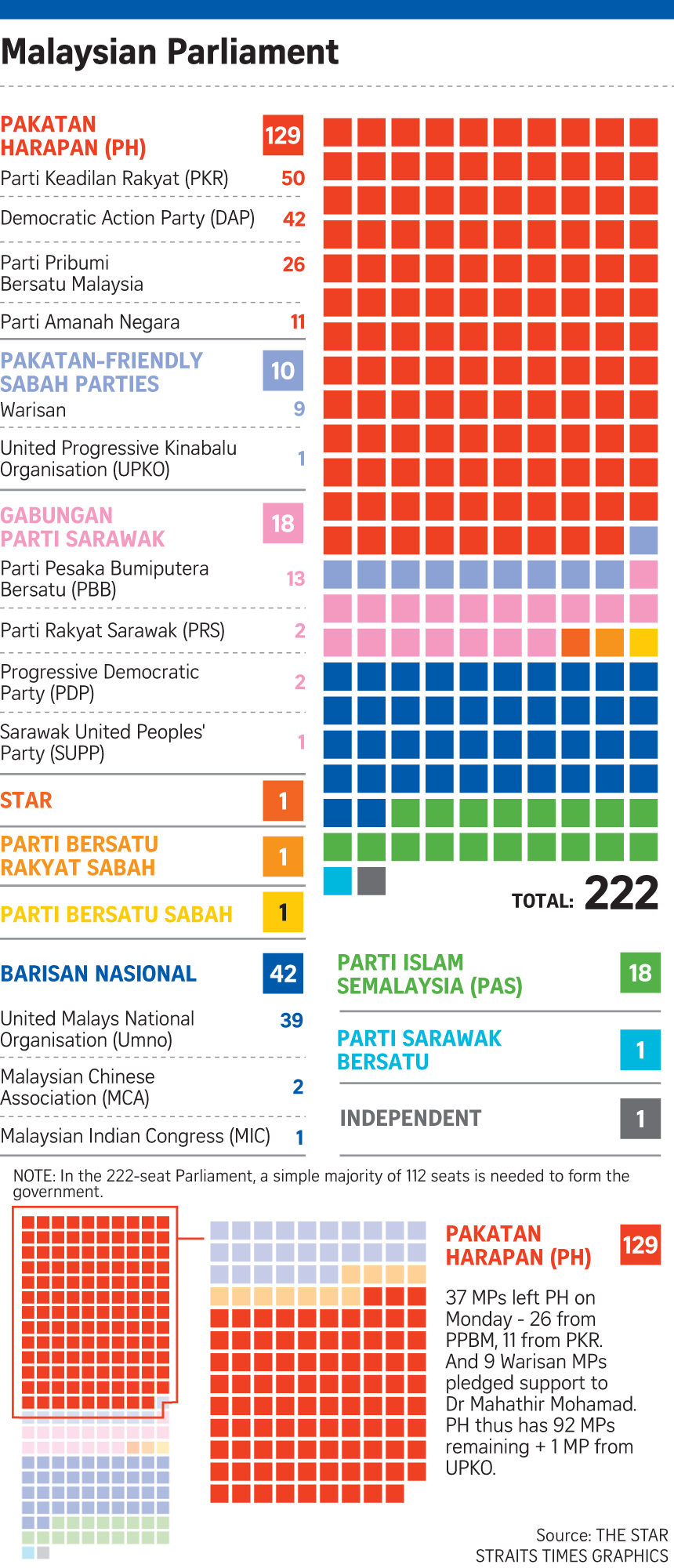What is the PH infighting about?
Sign up now: Get insights on the biggest stories in Malaysia

A banner during Malaysia's 2018 General Election showing Tun Dr Mahathir Mohamad (far left) and Datuk Seri Anwar Ibrahim running as part of Pakatan Harapan. Tensions have since plagued the coalition, causing it to break up.
PHOTO: AGENCE FRANCE-PRESSE
Malaysia's ruling coalition Pakatan Harapan (PH) collapsed yesterday, with its leader, Prime Minister Mahathir Mohamad, likely to form a new government, possibly with some of his old foes from Umno and Parti Islam SeMalaysia (PAS), and other allies.
Here is an explanation of the political changes happening in Malaysia.
WHAT IS PAKATAN HARAPAN?
Malaysia's PH consisted of four component parties, and was supported by two others in Sabah.
PH was formed just before the May 2018 General Election. It unexpectedly won federal power and eight state assemblies out of Malaysia's 13 state legislatures.
The four PH members were Parti Keadilan Rakyat (PKR, with 50 MPs), Democratic Action Party (DAP, 42 MPs), Parti Pribumi Bersatu Malaysia (PPBM, 26 MPs) and Parti Amanah Negara (11 MPs).
The two PH-friendly allies were Parti Warisan Sabah (nine MPs) and United Progressive Kinabalu Organisation (Upko, one MP).
Those parties thus had a total of 139 MPs in the 222-seat federal Parliament. A minimum of 112 seats is needed to retain control of the central government.
WHAT IS PAKATAN HARAPAN'S INFIGHTING ABOUT?
Tensions within the ruling coalition led by Tun Dr Mahathir from PPBM have been rising in recent months.
They arose partly because of a PH agreement before the general election that should the alliance win power, Dr Mahathir would step down after a period of time and hand over the premiership to PKR president Anwar Ibrahim, who was then in jail.
With the second anniversary of the election victory coming up and Dr Mahathir, 94, showing no sign that he is ready to step down, supporters of Datuk Seri Anwar, 72, started agitating for Dr Mahathir to step down quickly.
Adding to the tension is the leadership tussle between Mr Anwar and deputy party president Azmin Ali in PKR.

Datuk Seri Azmin had repeatedly asked for Dr Mahathir to continue as prime minister until the next general election, which is due in 2023. There has been talk that Dr Mahathir favours Mr Azmin over Mr Anwar in the prime ministership succession plan.
Yesterday, 11 PKR MPs led by Mr Azmin - four of them full Cabinet ministers - announced that they were leaving the party to form an independent bloc.
PPBM also announced that its MPs were leaving PH.
Adding to the long months of tension in PH are questions over how Dr Mahathir - who is supposed to run a Malaysia Baru (New Malaysia) government with race-based policies set aside - has seemingly returned to his pro-Malay agenda.
From his viewpoint, he wanted more Malays to support PH because in the 2018 General Election, the ruling coalition won only 25 per cent of the total Malay votes.
The remaining 75 per cent of Malay voters - Malaysia's majority race - backed Umno and PAS.
Meanwhile, lawmakers in Chinese-led DAP have been unhappy over issues such as the government's push to have Jawi (Malay language written in Ara-bic script) taught in Chinese-and Tamil-language schools, the go-vernment's indecision to accept a key Chinese school's education diploma called the Unified Exa-mination Certificate, and Dr Mahathir attending the strident Malay Dignity Congress in October last year.
A spate of by-election losses by PH did not help.
The four-party coalition won the first four by-elections held in 2018 after the deaths of state or federal lawmakers.
But last year, PH lost in four of the five by-elections held. The four losses were all in Malay-majority seats in Peninsular Malaysia. PH won only in Sandakan, Sabah, in a Chinese-majority seat.
The string of defeats is partly due to the two Malay opposition parties Umno and PAS forming an election pact called Muafakat Nasional (National Consensus) and pitting the fight in stark racial terms - weakened Malay Muslims versus a "Chinese/DAP-led" PH coalition.
In the only by-election held this year, PH again lost to the Umno-PAS combination, this time in a Muslim-majority seat in Sarawak.
WHAT HAPPENS NEXT?
Dr Mahathir's party PPBM is trying to form a new coalition and will need the same minimum of 112 MPs of the total 222 to back him.
This will consist of PPBM and the PKR faction led by Mr Azmin, along with Parti Warisan Sabah.
Though things remain fluid, the two main opposition groups, Umno-led Barisan Nasional (BN) and PAS, and MPs in Sarawak grouped under Gabungan Parti Sarawak (GPS), were also expected to join the new alliance.
It is not clear at the moment whether BN, PAS and GPS will formally join this planned new government or become unofficial backers.
The total strength of this new group, provisionally called Perikatan Nasional (National Alliance), is expected to be around 120 MPs.
This would be enough to deny the Anwar-led PKR, DAP and Amanah from claiming they have the minimum support to remain as government.
ARE LAWMAKERS ALLOWED TO CHANGE PARTIES?
Malaysia's political system allows a federal MP or a state assemblyman to defect to another party, or become an independent lawmaker, without losing his seat.
Defections have happened many times before, leading state governments to change hands - Sabah in 1994, and Perak in 2009.
After the 2018 General Election, several Umno state lawmakers in Perak and Kedah helped PH to come to power by jumping ship.


